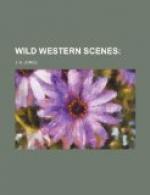“Oh, hang it, Sneak, just get me out of the fix, and I’ll tell you all about it.”
“It’s hung now—didn’t you say ‘hang it, Sneak?’” continued Sneak.
“Oh, come, now,” continued Joe; “if you were in this way, don’t you think I’d help you?”
“Cut him down, Sneak,” said Boone; and in a twinkling Sneak was up in the tree, and the string was severed. Joe came down with great force, his feet foremost, and running through the snow-crust to a great depth.
“I wish some of you would help me out of this,” said he, after struggling some time in vain to extricate himself.
“You’ll want me to carry you home next, I s’pose,” said Sneak, assisting him up. Joe made no reply; but as soon as he could cut the string away from his wrist, seized Sneak by the throat, hurled him on his back, and springing upon him, a violent struggle ensued for a few moments before they could be separated.
“What do you mean?” exclaimed Glenn, dragging Joe away from his prostrate victim.
“What did you do that for?” asked Sneak, rising up and brushing the snow from his head and face, his fall having broken the icy surface.
“You rascal, you! I’ll show you what for!” cried Joe, endeavouring to get at him again.
“Joe!” said Glenn, “if you attempt any further violence, you shall not remain another day under my roof!”
“He boxed my ear like thunder!” said Sneak; “I didn’t think the fellow had so much pluck in him! I like him better now than ever I did. Give us your paw, Joe.” Joe shook hands with him reluctantly, and then wiped a flood of tears from his face.
“He told me to put some asafetida on my hoots, and said I could then kill more wolves,” said Joe; “and it came within an ace of making them kill me.”
“It was very wrong to do so, Sneak,” said Boone, “and the boxing you got for it was not amiss.”
“I believe I think so myself,” said Sneak. “But it did make him kill more wolves after all—jest look at ’em all around here!”
Joe soon recovered entirely from the effects of his swing, his fright, and his anger, and looked with something like satisfaction on his many trophies lying round him; and when he disengaged his musket from the bough of the tree, he regarded it with affection.
They moved homeward, entirely content with the result of the excursion. Boone explained the reason why so many of the wolves were congregated about the island. He stated that the vines and bushes on which the deer feed in the winter were abundant and nutritious in the low lands along the river, and that great numbers of them repaired thither at that season of the year. The wolves of course followed them, and having now destroyed all the large deer in the vicinity of the island, and the small ones being enabled to run on the snow-crust, they found it necessary to muster in the chase as great a number as possible, and thus prevent their prey from escaping to the prairies. He said that the wolves preferred the timber, being enabled to make more comfortable lairs and dens among the fallen trees than out in the cold prairies. But their guns had wrought a fearful destruction among them. Perhaps three-fourths of them fell.




